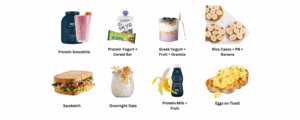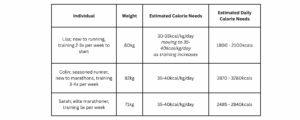
When the Greatest Ever Boots Let Me Down
July 7, 2025
Fueling For Your Marathon Part 2 – How To Fuel & Hydrate During Long Runs
July 28, 2025
When the Greatest Ever Boots Let Me Down
July 7, 2025
Fueling For Your Marathon Part 2 – How To Fuel & Hydrate During Long Runs
July 28, 2025How to Fuel for Your Marathon Part 1: Are you meeting your energy and recovery needs?
You’ve signed up for your first marathon, but the road ahead feels long. You’re slowly adding miles, building up to those long runs, but are you getting your nutrition strategy right from the start? Whether you’re chasing a finish line or proving to yourself that you can do hard things, your nutrition is just as important as your training plan.
This is the first in our 4-part Marathon Nutrition Series, designed to help you fuel confidently from Week 1 through race day. In this part, we’ll focus on nutrition foundations in the early training phase, before the mileage gets big and the carb loads begin.
Why It Matters
The first 4-8 weeks of marathon prep are often about building structure:
- Gradually increasing mileage
- Introducing tempo runs or strength training
- Adjusting your weekly routine
Each of these brings new energy demands, even if the training doesn’t yet feel “intense.” If you’re not fueling adequately now, you’ll end up playing catch-up when training peaks.
In this phase our main focuses should be hitting our basic energy needs and fueling properly around training. Marathon training can be overwhelming, not only physically, but for your schedule and mind. By starting these habits from week 1 of training, you are establishing routines that will carry through to race day. Because the week of your marathon, the last thing you want to be thinking of is nutrition. It is important to build the basics of your nutrition and fuel correctly from the start so it is second nature by the time race day comes around. Nailing your fueling basics will support proper recovery from your training, injury prevention, and help you reach your full potential.
Meet your energy needs early
If you’re unsure whether you’re fueling enough, ask yourself:
- Do I feel energised most days, not sluggish or constantly hungry?
- Do I eat 3-4 structured meals and 2-3 snacks per day?
- Do I skip meals or eat erratically due to work, family or busyness?
- Is my kitchen set up for quick, consistent meals?
- Am I regularly getting a mix of carbohydrates, protein, and colour on my plate?
If you answered “no” to several of these, now is the time to course correct. Underfueling early leads to poor adaptation, increased injury risk, and training fatigue that sneaks up later. Fueling consistently now helps build a more efficient, resilient body that’s ready for higher mileage when it comes.
During early training, your needs may range from 35 – 40 kcal per kg of body weight per day, depending on your body size and training volume. As your mileage builds, so will this number.
Fueling around your training sessions
Timing matters, especially after training.
Aim to refuel within 60 minutes. Include both carbs to replenish energy and protein to kickstart muscle recovery. Some post-run snack examples include:

Start training your gut. Especially if you run in the morning or have a temperamental stomach, you may need to build tolerance to small snacks before longer runs. This takes time to build to the necessary calories and carbohydrates you will need before and during runs. You may need to start small with something familiar, carb-based, and that you tolerate well. Consider these examples:

You don’t need a pre-run snack for every session, but if you struggle with stomach issues or low energy mid-run, now is the time to trial small, digestible carbs before your runs. During low/moderate-intensity runs, your body relies more on fat and muscle glycogen. But as your tempo work or long runs kick in, you’ll increasingly need carbs before and during to support performance and recovery. We’ll break this down in Part 2.
Putting it into Practice
If you’re just starting out, here’s your takeaway: Fuel consistently and with intention, especially around training.
Pick one or two changes to implement this week such as:
- Adding a consistent breakfast into your morning
- Adding a protein rich snack after a run
- Prep your recovery meals for the week
- Trial simple, easy to digest pre-run snacks to train your gut
Master your timing and energy needs now so you are ready for the next steps when they come. One shift, repeated often, creates momentum. Let’s build from there.
What’s next?
Our Fueling For Your Marathon webinar is on August 18th at 7:30pm. This session will give you a practical framework to match meals to mileage, prepare for long runs, and build your race-day plan.
References
Burke, L. & Hawley, J. (2018). Swifter, higher, stronger: What’s on the menu? Science, 362, 781–787. https://doi.org/10.1126/science.aau2093
Tiller, N. et al. (2019). Nutritional considerations for ultra-marathon training and racing. Journal of the International Society of Sports Nutrition, 16. https://doi.org/10.1186/s12970-019-0312-9
Bennett, J. & Kehoe, M. (2008). Marathon fueling techniques: Understanding and a proposed intake schedule. Strength & Conditioning Journal, 30, 56–65. https://doi.org/10.1519/SSC.0B013E318187F1B5
How to Fuel for Your Marathon Part 1: Are you meeting your energy and recovery needs?
You’ve signed up for your first marathon, but the road ahead feels long. You’re slowly adding miles, building up to those long runs, but are you getting your nutrition strategy right from the start? Whether you’re chasing a finish line or proving to yourself that you can do hard things, your nutrition is just as important as your training plan.
This is the first in our 4-part Marathon Nutrition Series, designed to help you fuel confidently from Week 1 through race day. In this part, we’ll focus on nutrition foundations in the early training phase, before the mileage gets big and the carb loads begin.
Why It Matters
The first 4-8 weeks of marathon prep are often about building structure:
- Gradually increasing mileage
- Introducing tempo runs or strength training
- Adjusting your weekly routine
Each of these brings new energy demands, even if the training doesn’t yet feel “intense.” If you’re not fueling adequately now, you’ll end up playing catch-up when training peaks.
In this phase our main focuses should be hitting our basic energy needs and fueling properly around training. Marathon training can be overwhelming, not only physically, but for your schedule and mind. By starting these habits from week 1 of training, you are establishing routines that will carry through to race day. Because the week of your marathon, the last thing you want to be thinking of is nutrition. It is important to build the basics of your nutrition and fuel correctly from the start so it is second nature by the time race day comes around. Nailing your fueling basics will support proper recovery from your training, injury prevention, and help you reach your full potential.
Meet your energy needs early
If you’re unsure whether you’re fueling enough, ask yourself:
- Do I feel energised most days, not sluggish or constantly hungry?
- Do I eat 3-4 structured meals and 2-3 snacks per day?
- Do I skip meals or eat erratically due to work, family or busyness?
- Is my kitchen set up for quick, consistent meals?
- Am I regularly getting a mix of carbohydrates, protein, and colour on my plate?
If you answered “no” to several of these, now is the time to course correct. Underfueling early leads to poor adaptation, increased injury risk, and training fatigue that sneaks up later. Fueling consistently now helps build a more efficient, resilient body that’s ready for higher mileage when it comes.
During early training, your needs may range from 35 – 40 kcal per kg of body weight per day, depending on your body size and training volume. As your mileage builds, so will this number.
Fueling around your training sessions
Timing matters, especially after training.
Aim to refuel within 60 minutes. Include both carbs to replenish energy and protein to kickstart muscle recovery. Some post-run snack examples include:

Start training your gut. Especially if you run in the morning or have a temperamental stomach, you may need to build tolerance to small snacks before longer runs. This takes time to build to the necessary calories and carbohydrates you will need before and during runs. You may need to start small with something familiar, carb-based, and that you tolerate well. Consider these examples:

You don’t need a pre-run snack for every session, but if you struggle with stomach issues or low energy mid-run, now is the time to trial small, digestible carbs before your runs. During low/moderate-intensity runs, your body relies more on fat and muscle glycogen. But as your tempo work or long runs kick in, you’ll increasingly need carbs before and during to support performance and recovery. We’ll break this down in Part 2.
Putting it into Practice
If you’re just starting out, here’s your takeaway: Fuel consistently and with intention, especially around training.
Pick one or two changes to implement this week such as:
- Adding a consistent breakfast into your morning
- Adding a protein rich snack after a run
- Prep your recovery meals for the week
- Trial simple, easy to digest pre-run snacks to train your gut
Master your timing and energy needs now so you are ready for the next steps when they come. One shift, repeated often, creates momentum. Let’s build from there.
What’s next?
Our Fueling For Your Marathon webinar is on August 18th at 7:30pm. This session will give you a practical framework to match meals to mileage, prepare for long runs, and build your race-day plan.
References
Burke, L. & Hawley, J. (2018). Swifter, higher, stronger: What’s on the menu? Science, 362, 781–787. https://doi.org/10.1126/science.aau2093
Tiller, N. et al. (2019). Nutritional considerations for ultra-marathon training and racing. Journal of the International Society of Sports Nutrition, 16. https://doi.org/10.1186/s12970-019-0312-9
Bennett, J. & Kehoe, M. (2008). Marathon fueling techniques: Understanding and a proposed intake schedule. Strength & Conditioning Journal, 30, 56–65. https://doi.org/10.1519/SSC.0B013E318187F1B5
Upgrade NOW
Upgrade NOW








